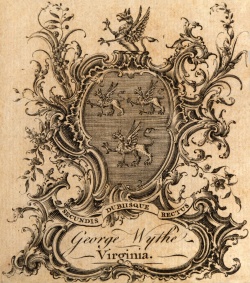Difference between revisions of "History of England during the Reigns of K. William, Q. Anne, and K. George I"
m |
m (→by James Ralph) |
||
| Line 17: | Line 17: | ||
|pages= | |pages= | ||
|desc= | |desc= | ||
| − | }}[[wikipedia:James Ralph|James Ralph]] (d. 1762) spent his younger years in Philadelphia, | + | }}[[wikipedia:James Ralph|James Ralph]] (d. 1762) spent his younger years in Philadelphia, acquainted with [[wikipedia:Benjamin Franklin]] and aspiring to be a poet.<ref> Laird, Okie, "Ralph, James (d. 1762)," ''Oxford Dictionary of National Biography'', Oxford University Press, 2004; "Ralph, James," in ''Appletons' Cyclopedia of American Biography'', v. 5, eds. James Grant Wilson and John Fisk (New York: D. Appleton & Company, 1900), 164. </ref> In 1724, he abandoned his family and moved to London where he lived on money borrowed from Franklin and found work teaching at a village school.<ref> Ibid.</ref> When Franklin made sexual advances towards Ralph’s mistress, the two men had a falling out. In 1727, Ralph resumed his literary career, publishing a book of poetry known as ''The Tempest, or, The Terrors of Death''.<ref> Okie, "Ralph, James".</ref> |
| − | Ralph intended his most important work,''The History of England during the Reigns of King William, Queen Anne, and King George I'', to be a continuation of William Guthrie’s ''[[General History of England|A General History of England]]''.<ref>Ibid.</ref> | + | Ralph intended his most important work,''The History of England during the Reigns of King William, Queen Anne, and King George I'', to be a continuation of William Guthrie’s ''[[General History of England|A General History of England]]''.<ref>Ibid.</ref> Despite his intentions, the title is misleading because the work does not progress beyond King William’s reign.<ref>Ibid.</ref> |
| − | The | + | The history sold poorly, but remains noteworthy for several reasons. Ralph incorporated far more documents into his analysis than his contemporary [[wikipedia:Paul de Rapin|Paul de Rapin]] had used when writing his own English history.<ref>Ibid.</ref> Additionally, Ralph gains distinction as the first historian to provide an in depth examination of the origins of the [[wikipedia:Glorious Revolution|Glorious Revolution]]. His work also focused on economics and the financial revolution of the 1690s more than others covering the same period.<ref>Ibid.</ref> Finally, Ralph departed from the norm of writing history from a partisan standpoint and pointed out the biases and errors in his predecessors’ analyses.<ref>Ibid.</ref> |
==Evidence for Inclusion in Wythe's Library== | ==Evidence for Inclusion in Wythe's Library== | ||
Latest revision as of 11:24, 7 September 2023
by James Ralph
| The History of England during the Reigns of K. William, Q. Anne, and K. George I | ||
|
at the College of William & Mary. |
||
| Author | James Ralph | |
| Published | London: Printed by D.Browne, for F. Cogan | |
| Date | 1744-1746 | |
| Edition | English | |
James Ralph (d. 1762) spent his younger years in Philadelphia, acquainted with wikipedia:Benjamin Franklin and aspiring to be a poet.[1] In 1724, he abandoned his family and moved to London where he lived on money borrowed from Franklin and found work teaching at a village school.[2] When Franklin made sexual advances towards Ralph’s mistress, the two men had a falling out. In 1727, Ralph resumed his literary career, publishing a book of poetry known as The Tempest, or, The Terrors of Death.[3]
Ralph intended his most important work,The History of England during the Reigns of King William, Queen Anne, and King George I, to be a continuation of William Guthrie’s A General History of England.[4] Despite his intentions, the title is misleading because the work does not progress beyond King William’s reign.[5]
The history sold poorly, but remains noteworthy for several reasons. Ralph incorporated far more documents into his analysis than his contemporary Paul de Rapin had used when writing his own English history.[6] Additionally, Ralph gains distinction as the first historian to provide an in depth examination of the origins of the Glorious Revolution. His work also focused on economics and the financial revolution of the 1690s more than others covering the same period.[7] Finally, Ralph departed from the norm of writing history from a partisan standpoint and pointed out the biases and errors in his predecessors’ analyses.[8]
Evidence for Inclusion in Wythe's Library
Listed in the Jefferson Inventory of Wythe's Library as "Guthrie's history of England & Ralph's continuation 5.v. fol." and given by Thomas Jefferson to his son-in-law, Thomas Mann Randolph. Later appeared on Randolph's 1832 estate inventory as "Ralph's Continuation of the History of England 2 [vols. ], $10.00." According to the English Short Title Catalogue, Ralph only published one edition — in London (1744-1746). Both George Wythe's Library on LibraryThing[9] and the Brown Bibliography[10] list Ralph's The History of England: during the Reigns of K. William, Q. Anne, and K. George I.
As yet, the Wolf Law Library has been unable to find a copy of this title.
See also
- A General History of England: From the Invasion of the Romans under Julius Cæsar to the Late Revolution in MDCLXXXIII
- Jefferson Inventory
- Wythe's Library
References
- ↑ Laird, Okie, "Ralph, James (d. 1762)," Oxford Dictionary of National Biography, Oxford University Press, 2004; "Ralph, James," in Appletons' Cyclopedia of American Biography, v. 5, eds. James Grant Wilson and John Fisk (New York: D. Appleton & Company, 1900), 164.
- ↑ Ibid.
- ↑ Okie, "Ralph, James".
- ↑ Ibid.
- ↑ Ibid.
- ↑ Ibid.
- ↑ Ibid.
- ↑ Ibid.
- ↑ LibraryThing, s.v. "Member: George Wythe," accessed on July 17, 2023.
- ↑ Bennie Brown, "The Library of George Wythe of Williamsburg and Richmond," (unpublished manuscript, May, 2012) Microsoft Word file. Earlier edition available at: https://digitalarchive.wm.edu/handle/10288/13433.
External Links
Read this book in Google Books.
